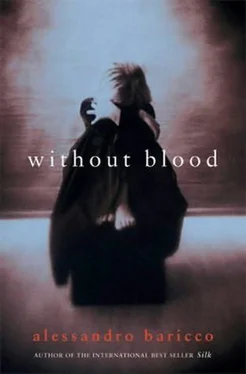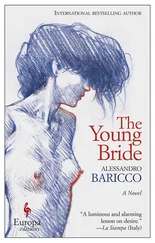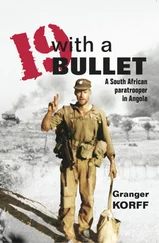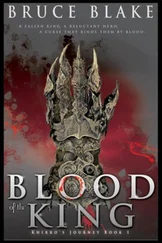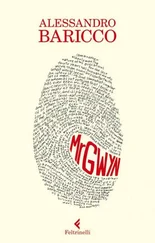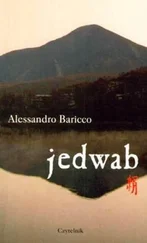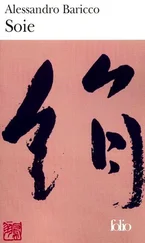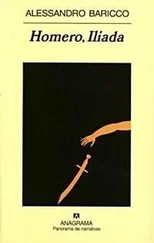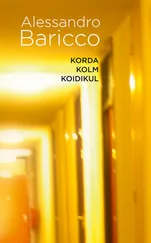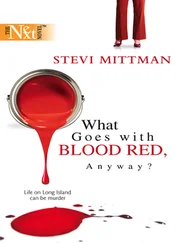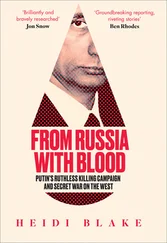He spoke calmly. He wasn’t nervous, not at all.
“Now you’ve found me.”
Then they were silent, because he had no more to say, and she said nothing.
● ● ●
“When I was a child my name was Nina. But everything ended that day. No one called me by that name anymore.”
“…”
“I liked it: Nina.”
“…”
“Now I have many names. It’s different.”
“In the beginning I remember a sort of orphanage. Nothing else. Then a man whose name was Ricardo Uribe came and took me away with him. He was the pharmacist in a little town deep in the countryside. He had no wife or relatives, nothing. He told everyone that I was his daughter. He had moved there a few months earlier. Everyone believed him. In the daytime I stayed in the rear of the pharmacy. Between customers he taught me. I don’t know why but he didn’t like me to go out alone. What there is to learn you can learn from me, he said. I was eleven. At night he sat on the sofa and made me lie beside him. I rested my head in his lap and listened to him. He told strange stories about the war. His fingers caressed my hair, back and forth, slowly. I felt his sex, under the material of his pants. Then he kissed my forehead and let me go to sleep. I had a room to myself. I helped him keep the shop clean and the house. I washed and cooked. He seemed a good man. He was afraid, but I don’t know what he was afraid of.”
“…”
“One night he leaned over and kissed me on the mouth. He went on kissing me, like that, and meanwhile he stuck his hands under my skirt and everywhere. I did nothing. And then, suddenly, he pulled away from me, and began to cry and ask me to forgive him. He seemed terrified. I didn’t understand. A few days later he said that he had found me a fiancé. A young man from Río Galván, a town nearby. He was a mason. I would marry him as soon as I was old enough. I went to meet him, the following Sunday, in the square. He was a handsome boy, tall and thin, very thin. He moved slowly, maybe he was sick, or something like that. We introduced ourselves, and I went home.”
“…”
“It’s a story like any other. Why do you want to hear it?”
The man thought the way she spoke was strange. As if it were a gesture that she wasn’t used to. Or as if she were speaking a language that was not her own. As she searched for words she stared into space.
“A few months later, on a winter evening, Uribe went out to the Riviera, a sort of tavern where the men gambled. He went every week, always the same day, Fri-day. That night he played until very late. Then he found himself with four jacks in his hand, in front of a pot in which there was more money than he would see in a year. The game had come down to him and the Count of Torrelavid. The others had put in a little money and then had let it go. But the Count was stubborn. He kept raising the bet. Uribe was sure of his cards and stayed with him.
They reached the point where the players lose any sense of reality. And then the Count put in the pot his fazenda of Belsito. In the tavern everything came to a halt. Do you gamble?”
“No,” said the man.
“Then I don’t think you’ll understand.”
“Try me.”
“You won’t understand.”
“It doesn’t matter.”
“Everything came to a halt. And there was a silence you won’t understand.”
The woman explained that the fazenda of Belsito was the most beautiful fazenda in that land. An avenue of orange trees led to the house at the top of a hill, and from there, from the house, you could see the ocean.
“Uribe said that he had nothing to bet that was worth Belsito. And he placed his cards on the table. Then the Count said that he could always bet the pharmacy, and then he began to laugh like a lunatic, and some of those who were there began to laugh with him. Uribe smiled.
He still had a hand over his cards. As if to say goodbye to them. The Count became serious again, leaned forward, across the table, looked Uribe in the eye, and said to him:
“‘You have a lovely child, though.’
“Uribe didn’t understand right away. He felt all those eyes upon him, and he couldn’t think. The Count simpli-fied the situation.
“‘Belsito against your daughter, Uribe. It’s an honest offer.’
“And on the table, right under Uribe’s nose, he placed his five cards, face down.
“Uribe stared, without touching them.
“He said something in a whisper, but no one could ever tell me what it was.
“Then he pushed his cards toward the Count, sliding them across the table.
“The Count came and got me that same night. He did something unpredictable. He waited sixteen months, and when I was fourteen he married me. I gave him three sons.”
“…”
“Men are difficult to understand. The Count, before that night, had seen me only once. He was sitting in the café and I was crossing the square. He had asked someone:
“‘Who is that girl?’
“And they told him.”
Outside it had started raining again, and the café had filled up. One had to speak loudly to be understood. Or sit closer. The man said to the woman that she had an odd way of talking: she seemed to be telling the story of someone else’s life.
“What do you mean?”
“It’s as if nothing matters to you.”
The woman said that, on the contrary, everything mattered to her, too much. She said that she felt nostalgic for every single thing that had happened to her. But she said it in a hard voice, without melancholy. Then the man was silent, looking at the people around them.
He thought of Salinas. He had been found dead in his bed one morning, two years after that business of Roca.
Something with his heart, they said. Then a rumor came out that his doctor had poisoned him, a little every day, slowly, for months. A slow agony. Horrifying. The matter was investigated but nothing came of it. The doctor’s name was Astarte. He had made a little money, during the war, with a preparation that cured fevers and infections.
He had invented it himself, with the help of a pharmacist.
The preparation was called Botrin. The pharmacist was called Ricardo Uribe. At the time he worked in the capital. When the war was over he had had some trouble with the police. First they found his name on the list of sup-pliers for the hospital of the Hyena, then someone came forward and said he had seen him working there. But many also said that he was a good man. He presented himself to the investigators and explained everything, and when they let him go he took his things and went away to a small town buried in the countryside, in the south. He bought a pharmacy there, and resumed his profession.
He lived alone with a small daughter he called Dulce. He said the mother had died many years earlier. Everyone believed him.
Thus he hid Nina, the surviving daughter of Manuel Roca.
The man looked around without seeing anything. He was in his thoughts.
The savagery of children, he was thinking.
We have turned over the earth so violently that we have reawakened the savagery of children.
He looked back at the woman. She was looking at him.
He heard her voice saying:
“Is it true that they called you Tito?”
The man nodded yes.
“Had you ever met my father before?”
“…”
“…”
“I knew who he was.”
“Is it true that you were the first to shoot him?”
The man shook his head.
“What difference does it make…”
“You were twenty. You were the youngest. You had been fighting for only a year. El Gurre treated you like a son.”
Then the woman asked if he remembered.
The man stared at her. And only in that instant, finally, did he see again, in her face, the face of that child, lying there, impeccable and right, perfect. He saw those eyes in these, and that extraordinary strength in the calm of this tired beauty. The child: she had turned and looked at him. The child: now she was there. How dizzying time can be. Where am I? the man wondered. Here or there?
Читать дальше
